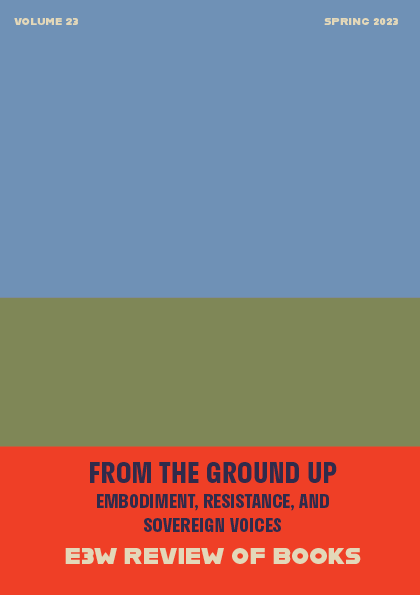
In a 2003 interview, transformative activist and writer Grace Lee Boggs reflected on her organizing work. Boggs shared that “I’ve come to believe that you cannot change any society unless you take responsibility for it, unless you see yourself as belonging to it and responsible for changing it.” When we reflect on the work represented in the 2021-2022 volume of the E3W Review of Books, “Iterative Intimacies: Refusing Legacies of the Changing Same,” we hear echoes of Boggs’s call to consider, examine, and act from an understanding of what Senior Editors Sophia Monegro and Candice Lyons called “the intimacies of continents, of bodies, of nations, and of history.” A year since the publication of Volume 22, we have experienced the knots of emerging intimacies and coalitions, the strain of alienation and welcome distance, and (perhaps all at once) the possibility that something transformative might take hold.
Longtime readers of the E3W Review of Books may notice that this year’s volume is a little longer than usual. We’re thrilled to share that the team of new and returning reviewers, Shepherd Editors, and Special Section Editors have helped grow this volume to include 69 reviews. As we’ve worked with this generous and insightful team, we’ve been struck by the degree to which this process has become intertwined with the theme of this year’s review. Represented in these pages are voices from across and beyond The University of Texas at Austin: our reviewers from the Department of English have worked closely with reviewers and editors in the School of Information, Geography rubs elbows with Mexican American Studies, and Anthropology sits alongside American Studies and Curriculum & Instruction. Also represented in this volume is a wide set of demographic interests that bring in varied ethnic and third world contexts and help contribute to timely conversations on the political implications and inherent pluralities of categories such as the global and the local. This is only a small snapshot of the extensive disciplinary web of relations in these pages, and we take these ties to remind us that the coalitions we build together help us approach transformation with difference as an essential asset to our work.
Table of Contents (pages correspond with print version)
Editorial Introduction
From The Ground Up: Embodiment, Resistance, and Sovereign Voices
| Edited by KEERTI ARORA and HANNAH HOPKINS | 8 |
Pedagogies of Care and Belonging: Contemporary Classrooms and Healthcare Access
| Edited by LIZ BENDER | 12 |
Climates of (In)Justice: Geographies, Environment, and Place
| Edited by HALEY EAZOR AND DEBARATI ROY | 21 |
Coalitions of Practices and Power: Gender, Sexuality, and Resistance
| Edited by WESTON RICHEY AND SARAH FRANKIE SUMMERS | 37 |
Runaway Debt: Precarization, Subversion, and the Refusal to Pay
| Edited by NANDINI MAJUMDAR & KATHLEEN FIELD | 55 |
Networks of Collaboration: Blackness, Indigeneity, and Communities Pursuing Justice
| Edited by HOLLY GENOVESE | 67 |
| EMMANUELLA AMOH | The New Jim Crow: Mass Incarceration in the Age of Colorblindness by Michelle Alexander | 68 |
| AMARAINIE MARQUEZ | Felon: Poems by Reginald Dwayne Betts | 69 |
| KETURAH NICHOLS | Black Disability Politics by Sami Schalk | 70 |
| F. JOSEPH SEPÚLVEDA ORTIZ | Translating Blackness: Latinx Colonialities in Global Perspective by Lorgia García Peña | 72 |
| ALLISON PUJOL | Mr. Morale and the Big Steppers by Kendrick Lamar | 73 |
Markers of Movement: Postcoloniality, Borders, and Migration
| Edited by NINA GARY AND AMANDA TOVAR | 75 |
Infrastructures of Memory: Information, Archive, And Media Studies
| Edited by KEVIN GIBBS AND ALI GUNNELLS | 89 |
Ecologies of Solidarity: Organizing, Labor, and Activism
| Edited by ALLISON PUJOL and JACK MURPHY | 106 |
Accounts of Dissent and Resilience: Literary Studies, Design, & Expressive Cultures
| Edited by I. B. HOPKINS and MICHAEL VACLAV | 118 |
| CONTRIBUTORS | 134 |

